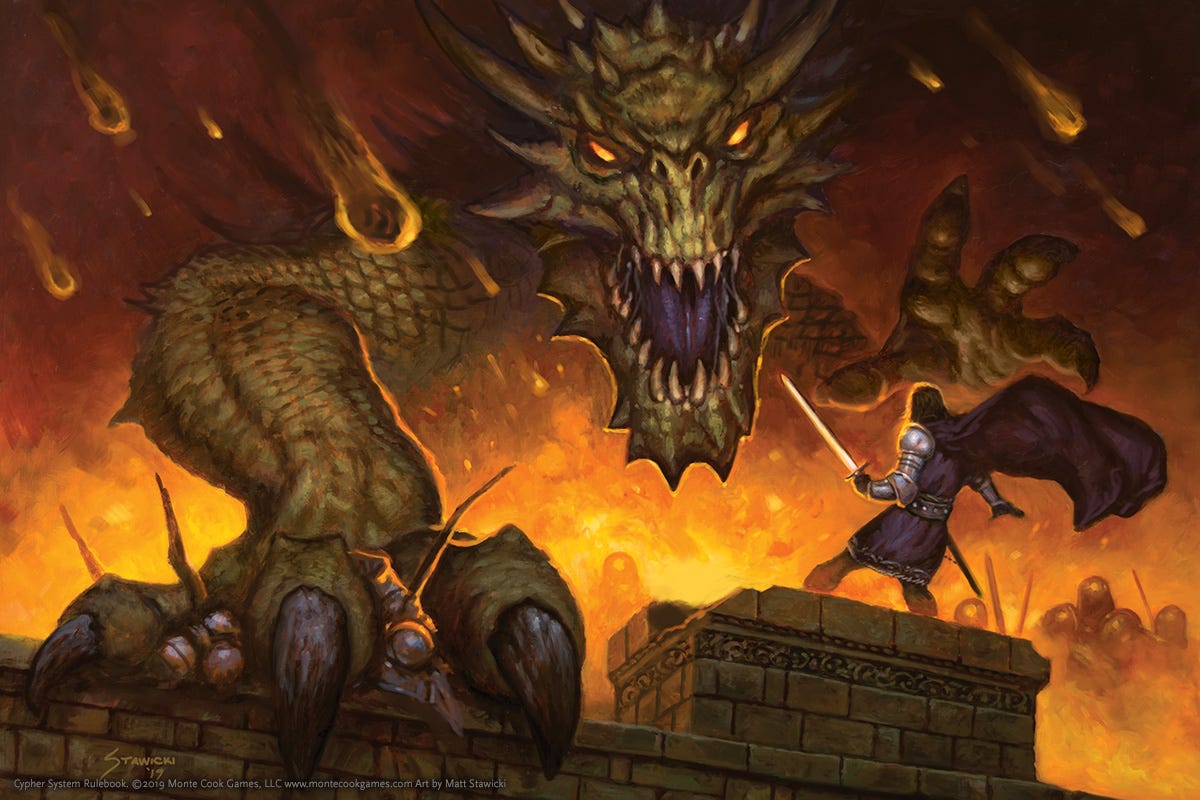Injurious Rules
As I wrote a bit ago, our own experiences as designers alongside what we’ve heard from others who have played the game have prompted some changes to the Cypher System.
A frequent area of discussion has often been the way PCs suffer and track damage. (To be clear, this is true only of PCs. The way NPCs and creatures suffer and track damage won’t change—it’s too clean and easy.) The idea in Cypher has been that as you suffer wounds, you get weaker, and are thus able to do less amazing things than when you are fresh and hale. Some GMs have said, however, that this system makes their players less likely to use points from their pools for Effort to improve their chances on a task or to utilize their special abilities. It felt, they said, like too much of a risk to spend their “hit points.” While there are plenty of ways to explain why this isn’t really an appropriate way of looking at it, the truth is that D&D is so deeply embedded in the mindset of so many gamers that a lot of us just can’t help but hoard whatever kinds of “points” our characters have like misers clutching pennies.
So I started looking at different ways to do it. Fresh off of designing The Magnus Archives RPG, I was already in the mindset of having “categories” of damage, so to speak. In that game, when you take minor injuries (or any sort of mental shock), you gain Stress. If you suffer anything that might send a person to the hospital, you track it as a serious injury. Like the damage track in Cypher, take even a few such injuries and you risk death. It’s meant to be a very lethal game, where your character’s life is always in danger when facing a bad guy with a gun or a knife, or one of the monsters of the setting.
That’s too lethal for most genres, and the idea of stress isn’t always appropriate for every game. But the general idea of narratively talking about injuries and wounds rather than points of damage was appealing. And it spoke to the goal of preserving the story-based focus of Cypher, if not doubling down on it.
In this new take, there are minor, moderate, and major wounds, each tracked separately. Minor wounds don’t debilitate you until you take the max you can withstand, usually five. At that point, further minor wounds become moderate wounds. When you’ve suffered four moderate wounds, your tasks are hindered, and further minor and moderate wounds are tracked as major wounds. Each major wound you sustain hinders your actions by another step, and if you take just three of these, you’re dead.
But they don’t always work in a cascade like that. When you get a bruise or a cut, it’s a minor wound, but if someone slashes you with a sword or you fall off the roof of a house, it’s a moderate wound. And the bite of a gigantic monster or a shot from a high-powered rifle is likely a major wound.
Fortunately, armor can reduce the severity of a wound if you make a block roll, and the better the armor, the more it eases that roll. Alternatively, you can still make a dodge roll to avoid the damage entirely, but wearing armor makes that more difficult. These rules give players an interesting decision in combat—dodge or block—and depending on the character, one is probably a lot easier than the other. You can’t really do both simultaneously. Circumstances play into this as well. Even if you’re wearing incredible armor, if you’re facing a soul-devouring ghost, you probably don’t want it to touch you at all. And if someone’s spraying dozens of bullets at you with an Uzi, even the most nimble character probably can’t dodge them all, and they’ll really wish they were wearing armor to block.
Wounds can be healed in all the ways you’d expect—first aid, technology, magic, rest, a hospital stay—but in addition, you can use Might points and a little time to remove a wound you’ve suffered, narratively explaining that given a bit of time you determined that it wasn’t as bad as you had initially thought.
Characters might have all manner of special abilities that allow them to ignore some wounds, withstand more wounds than normal, or reduce wounds’ severity. Essentially, it’s as easy to create a character who is a proverbial tank that can take incredible amounts of punishment and keep going as it is to create a character with amazing reflexes that no one can lay a hand upon. Or, you can make a character that doesn’t focus on either of those things and avoid dangerous situations entirely, because there’s so much to do in Cypher beyond just combat. And that’s going to be more true than ever going forward.


Death Spiral mechanics are always difficult. They make it tough to simulate the action-movie trope of the hero getting the living crap kicked out of him before going Beast Mode and turning the tables. But, if the game is supposed to be dangerous and deadly...
I really like this approach, especially for games with a darker tone. We have something like this in the 2dX Engine. Wounds have a numerical rank along with a descriptor (light, moderate, serious, critical, deadly). Wounds of rank 3+ trigger potential injuries which can be long lasting disadvantages. This opens up a lot of interesting design space for characters abilities that interact with wounds and injuries along with the healing of the individual wounds themselves. I look forward to seeing what this looks like for the Cypher System!